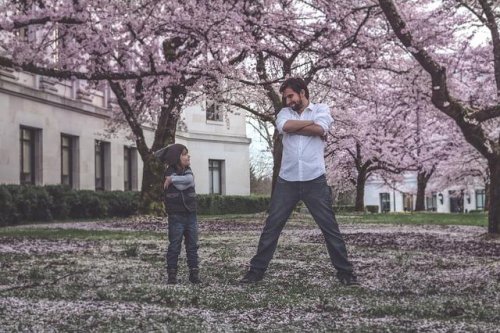Why do children laugh when you call them out?

Many children laugh sometimes when you call them out. But beyond trying to tease their parents, they are trying to avoid conflict. Let’s see what’s really going on.
You are trying to correct some of their behavior or get their attention due to bad behavior when they suddenly let out a laugh that leaves you feeling bewildered. Surely your first reaction will be to scold them that much more forcefully and demand respect.
But did you know that they aren’t trying to mock you?
Contrary to what we often believe, a child laughing during a scolding isn’t trying to do anything other than avoid the problem. We are dealing with a nervous laugh due to the lack of knowledge regarding management of emotions and the problems that have been created due to the decision that they made.
If you see that they are laughing because you called them out, they are just showing their nervousness.
Without a doubt, mom and dad may feel significant frustration because they feel they haven’t achieved their main objective which was to correct a situation. However, it’s important to realize that there is another goal in these circumstances: teaching them to channel this nervousness with love and lots of patience.
Facing this scenario, the most important thing is not to forget that your little one doesn’t know how to deal with a discussion or take responsibility for a poor choice of action.
Simply take a deep breath and sit down together and explain why this isn’t good and how they should deal with these cases.
What to do when children laugh when you call them out?

You probably think it’s a pretty delicate topic because they may even tend to laugh when being called out by others (teachers, family members, or another adult). What’s for sure is that we need to start to correct our reactions before telling them not to do it.
The first step is to stay calm. If necessary, step away for a bit and reflect on what’s happening. After this, come back ready to talk about what they just did and give them the guidance they need. Maybe it will be hard for you, but it’s an important step.
Stay calm and don’t let your frustration make you too hard on your child.
After you’ve made this point, forget the reactions of anger and annoyance. It’s inconsistent to ask them to control the distress caused by a scolding if we don’t know how to manage our own emotions.
Tips for moms
Speaking firmly and seriously is the key to achieving good communication.
Don’t get into this game for anything in the world. If your child wants to complain about something or stress a particular topic, pay them the kind of attention you would want to be given yourself.
Of course, if it’s your turn to acknowledge a mistake, show that it can be something simple using words full of honesty.
If you weren’t able to control your temper, simply turn to them and say that you are very sorry. Insist on explaining why it’s not okay to laugh when someone calls you out on something and give them space to explain the reasons that led to what happened.
Don’t face them while you’re still angry because it won’t do anything but reinforce their fears. Self-control is the basis of promoting coherent discipline without fear and without repression. Obedience does not have to be synonymous with submission.
And, of course, be flexible. Listen patiently and come to an agreement. If it’s not something that can add to a discussion because it represents a danger or isn’t in the best interest of their well-being, let them speak and ask them with love not to repeat this in order to protect themselves.
When does this response disappear?

It’s obvious that you can feel beset by this reaction from your little one and would love to press a button that would allow you to get rid of this problem. But, the best thing that you can do is be patient, stay calm and carry on with the recommendations that we have given you. If you grow as a person, so will your child.
Patience is the key for promoting proper discipline.
That said, if your baby is only one or two years old and tries to divert your attention with a hug or a kiss, don’t be afraid or feel they are trying to mock you. They don’t know how to manage their own emotions much less those of other people. But, once they get past this stage, work together to make everything better with lots of love and understanding.
All cited sources were thoroughly reviewed by our team to ensure their quality, reliability, currency, and validity. The bibliography of this article was considered reliable and of academic or scientific accuracy.
- Sauter, D., Evans, B., Venneker, D., & Kret, M. (2018). How do babies laugh?. The Journal of the Acoustical Society of America, 144(3), 1840-1840. https://asa.scitation.org/doi/abs/10.1121/1.5068109
- Addyman, C., & Addyman, I. (2013). The science of baby laughter. Comedy Studies, 4(2), 143-153. https://www.tandfonline.com/doi/abs/10.1386/cost.4.2.143_1
